Key takeaways:
- Truth and integrity are foundational in advocacy, requiring alignment of actions with beliefs and fostering genuine dialogue.
- Honest communication is vital in pro-life advocacy, as it builds trust and enables constructive conversations, even with opposing views.
- Developing personal integrity involves making conscious choices, prioritizing authenticity over popularity, and embracing vulnerability in communication.
- Engaging with diverse perspectives and sharing personal stories can enhance advocacy, inspiring others to reflect on their values and uphold truth.
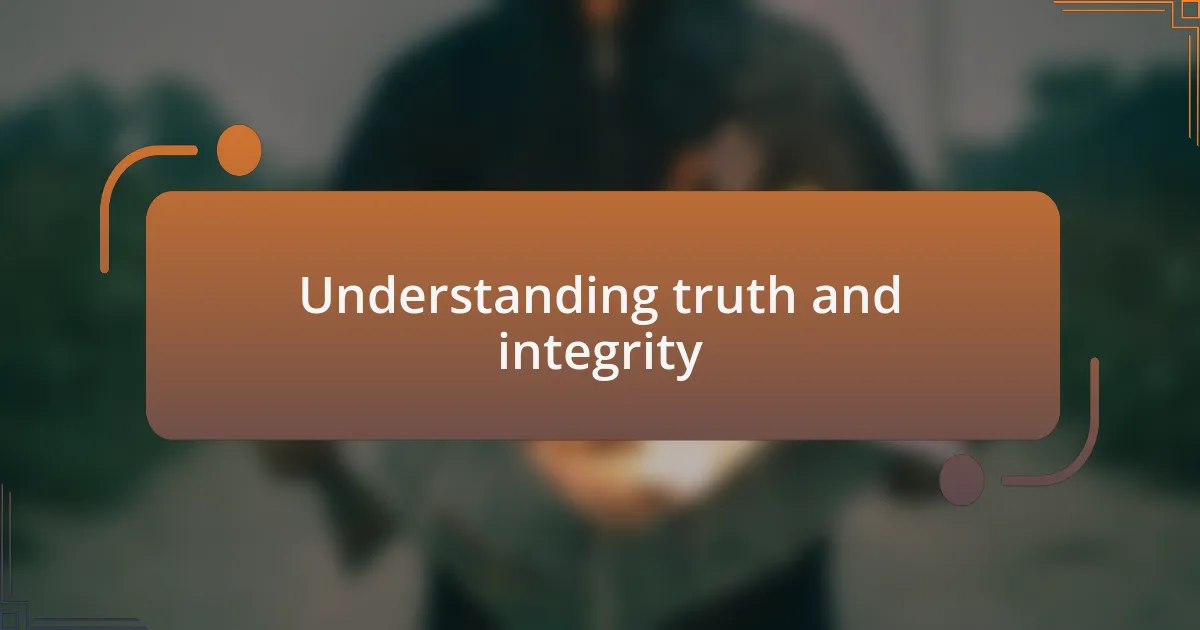
Understanding truth and integrity
Understanding truth and integrity involves recognizing their foundational role in any advocacy effort. I remember an instance during a community meeting where someone misrepresented facts about a pro-life initiative. It struck me how easily misinformation could distort people’s perceptions. Have you ever felt that unsettling disconnect between what is presented and what you know to be true? That moment reminded me that integrity is about aligning our actions with our beliefs, ensuring we present accurate information.
As I navigated through various discussions, I realized that truth and integrity go beyond mere facts; they embody the sincerity of our intentions. In a deeply emotional debate, I once felt an overwhelming sense of responsibility to communicate not just statistics, but the human stories behind them. How do we balance our passion with honesty? I believe it means being transparent, even when it’s uncomfortable, and understanding that our integrity can inspire trust and foster genuine dialogue.
Reflecting on my experiences, I’ve learned that living with integrity may sometimes require sacrifices. There have been times when I’ve had to stand up against popular opinion because I believed it compromised our message. Isn’t it challenging to maintain that balance between standing firm in your beliefs and being receptive to new ideas? Yet, through these challenges, I’ve found that commitment to truth builds deeper connections, not just within ourselves but with those around us.
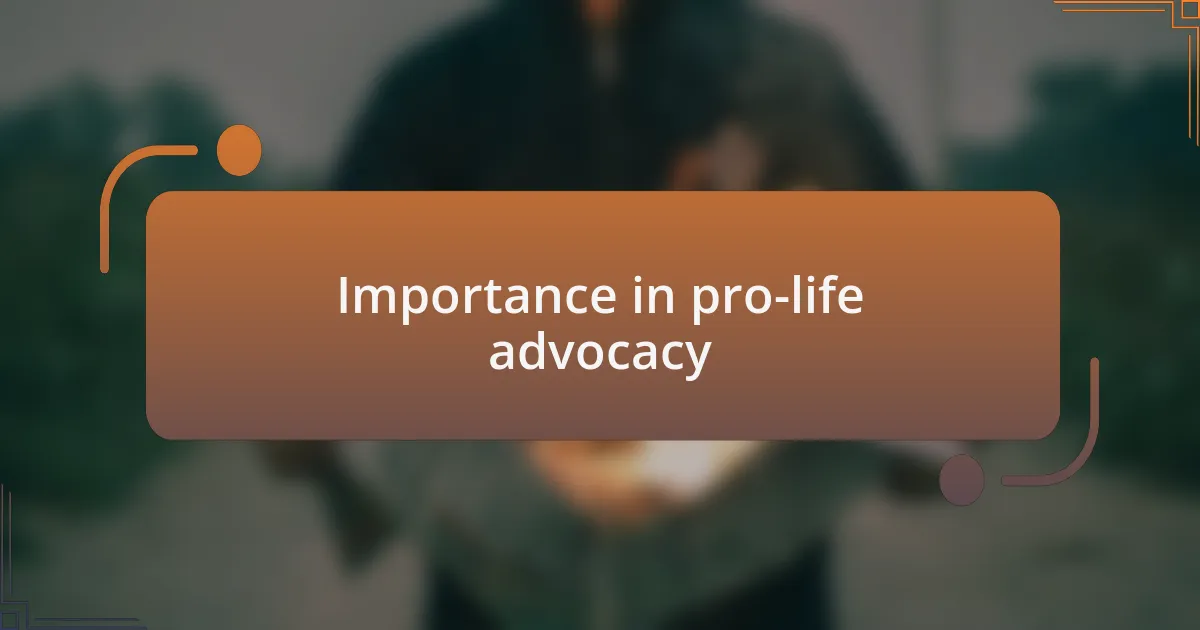
Importance in pro-life advocacy
The importance of truth and integrity in pro-life advocacy cannot be overstated. I recall a time when I attended a rally, feeling a palpable sense of purpose in the crowd. Yet, amid the energy, I overheard conversations peppered with half-truths. How does that affect our mission? It nudges me to consider how each statement we make matters—not just for our credibility, but for the individuals we aim to support.
In my experience, honest communication is fundamental to fostering meaningful relationships, even with those who disagree with us. I once engaged in a heartfelt conversation with a friend who held opposing views. By openly sharing facts while also listening to his concerns, I could see a shift in his perspective. Have you ever noticed how transparency can bridge gaps? That moment reinforced my belief that integrity paves the way for understanding and respect, encouraging a dialogue where both sides feel heard.
Moreover, the moral weight of our advocacy demands that we tread carefully. I faced a situation where some wanted to push a narrative that we knew was exaggerated. I had to weigh the impact of that choice. Isn’t it easy to succumb to the temptation of sensationalism? Yet, I found that staying true to our principles ultimately uplifts the conversation, allowing us to be advocates not just for the unborn, but also for honesty and respect among all people involved.
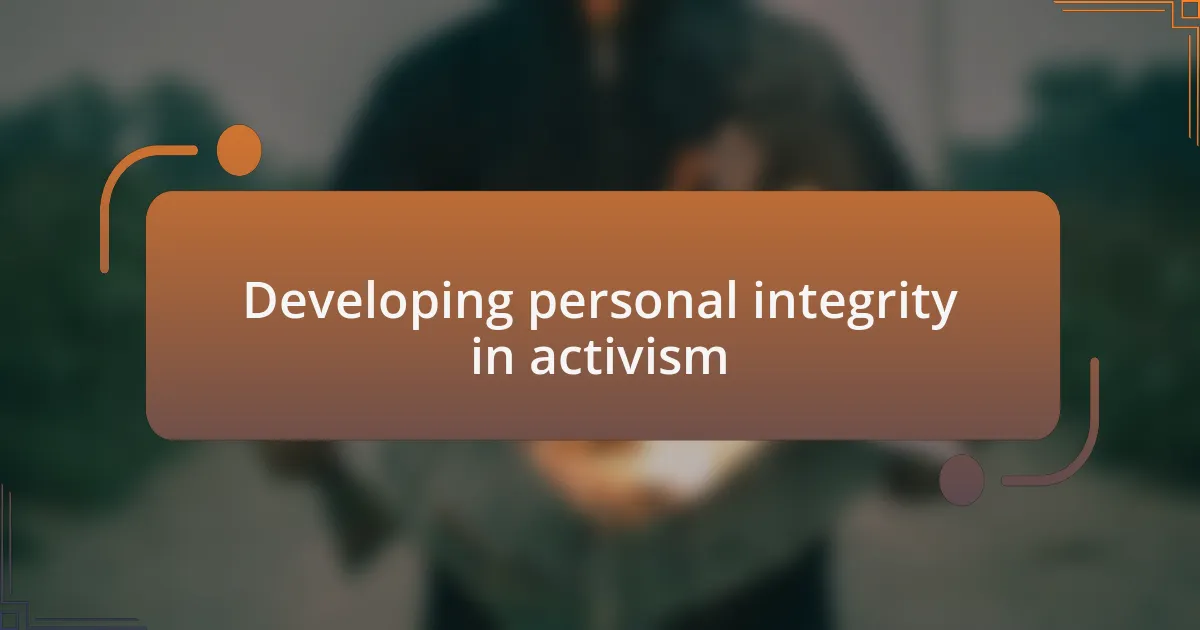
Developing personal integrity in activism
Developing personal integrity in activism requires a commitment to authenticity. I remember attending a workshop where we discussed how easy it is to get caught up in the movement’s zeal and stray from honest communication. Have you ever felt that pressure to amplify a message, even if it means bending the truth? That moment reminded me that our role as advocates extends beyond just promoting our cause; it encompasses staying true to our values.
I once realized the significance of consistency when I spoke at a local event. I shared a personal story about my journey with pro-life advocacy that emphasized compassion over confrontation. Afterward, a listener approached me, expressing how my honesty made him reconsider his viewpoint. Isn’t it fascinating how vulnerability can create a pathway to understanding? This experience solidified my belief that integrity fuels activism, making our voices more relatable and impactful.
Ultimately, developing integrity means making conscious choices, especially in difficult moments. I was once pressured to endorse a campaign that didn’t fully resonate with my ethical beliefs. After some reflection, I chose to voice my concerns, even if it meant facing criticism from peers. Was it challenging? Absolutely. But asserting my values reaffirmed my commitment to both the cause and to myself. In activism, our personal integrity isn’t just an asset; it’s the foundation for genuine change.
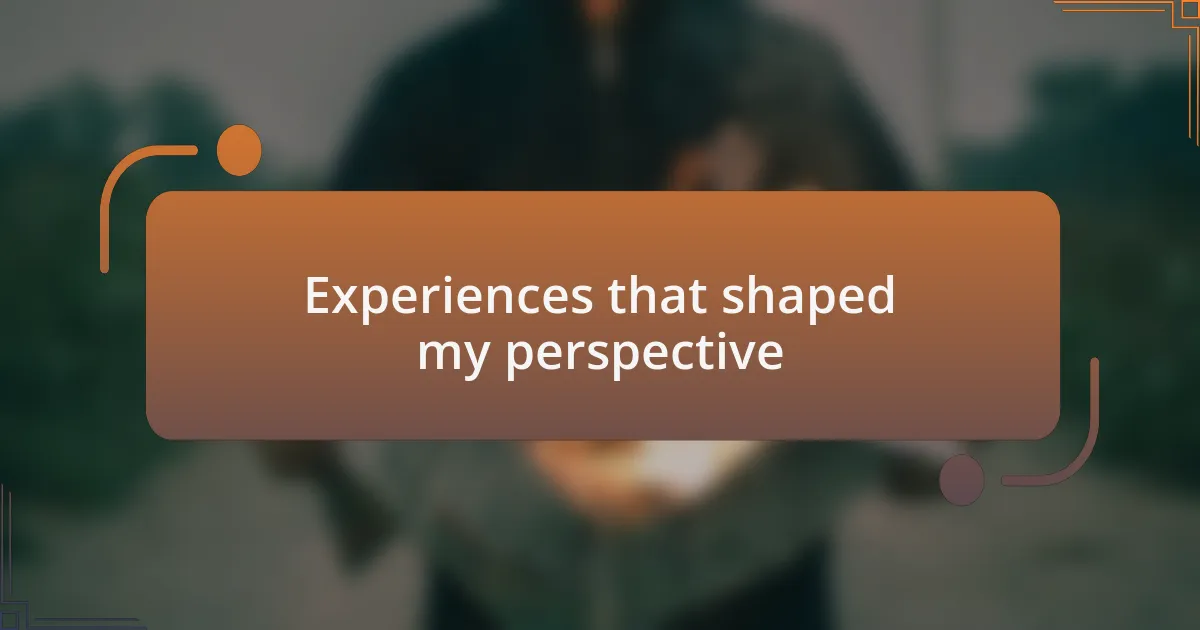
Experiences that shaped my perspective
The turning point in my understanding of truth and integrity occurred when I volunteered at a crisis pregnancy center. One evening, a young woman came in, visibly distressed and seeking help. Rather than just providing information, we engaged in a heartfelt conversation about her fears and hopes. This experience taught me that honesty isn’t just about giving facts; it’s about offering a safe space where people can explore their truths without judgment. Have you ever thought about how powerful a listening ear can be in fostering trust?
Another pivotal moment was during a panel discussion with other advocates. We were discussing strategies, and it struck me how some ideas were presented without considering the full implications for those affected. I chose to share a counterpoint gently, emphasizing the importance of empathy in every decision we make. Reflecting on that exchange, I felt an overwhelming sense of responsibility—who are we to dictate solutions without truly understanding the complexities of others’ lives? That realization expanded my perception of integrity beyond personal honesty into a shared commitment to understanding and compassion.
I was once involved in a fundraising campaign where the messaging felt overly sensationalized. Initially, I hesitated to voice my concerns, fearing backlash from supporters. After much deliberation, I decided to suggest a more grounded approach. The relief I felt after speaking up was profound; it reaffirmed that staying true to my principles outweighed any temporary discomfort. Isn’t it remarkable how confronting potential conflict can ultimately strengthen our resolve and define our personal integrity?
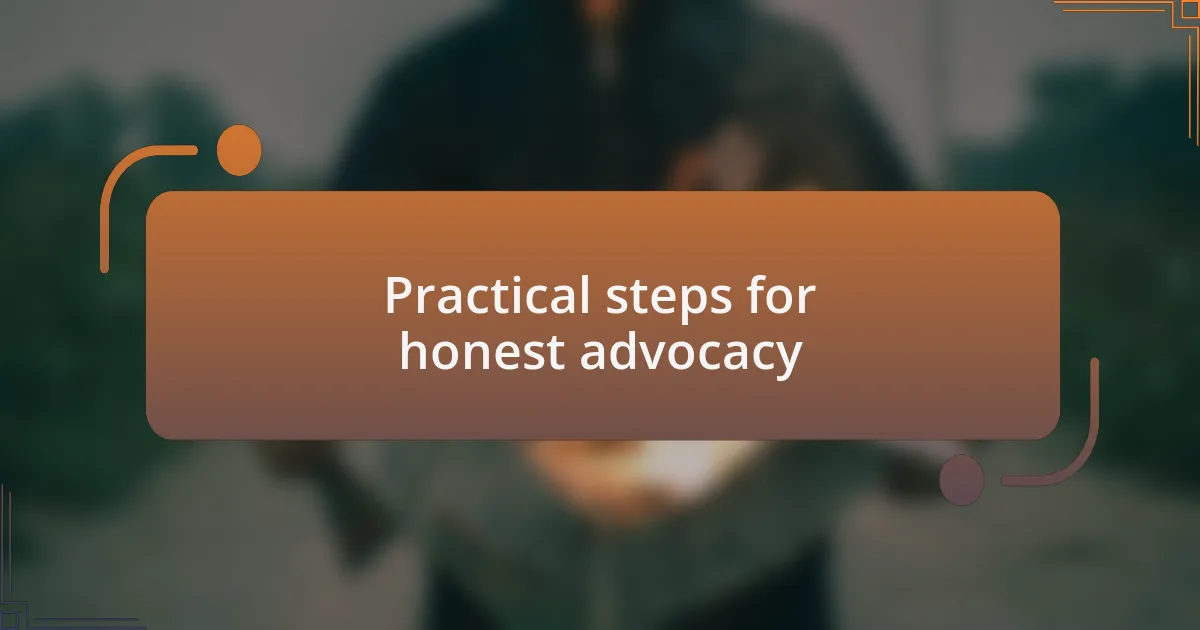
Practical steps for honest advocacy
When advocating honestly, it’s essential to ground your arguments in personal experiences and verified information. I remember during a workshop on effective communication, sharing my own story about the impact of unplanned pregnancies. This personal touch resonated with the audience, illustrating that truth doesn’t only come from statistics but also from lived experiences. Isn’t it fascinating how sharing our vulnerabilities can foster a deeper connection with our listeners?
Another practical step is embracing transparency, even when it’s uncomfortable. I’ve had moments where I had to admit the limitations of my knowledge on a topic. For instance, when discussing legal aspects of pro-life advocacy, I once had to pause and acknowledge, “I’m still learning.” This honesty didn’t weaken my position; instead, it built trust. How often do we miss the chance to connect when we try to project infallibility instead of authenticity?
Engaging with opposing views can also enhance your advocacy. I recall attending a debate where I was challenged to consider alternative perspectives on reproductive rights. Instead of getting defensive, I chose to listen actively and reflect on their points. This approach not only broadened my understanding but also demonstrated that integrity lies in seeking truth—even when that truth is uncomfortable or contrary to my beliefs. It’s a reminder that advocacy is as much about dialogue as it is about declaring a stance.
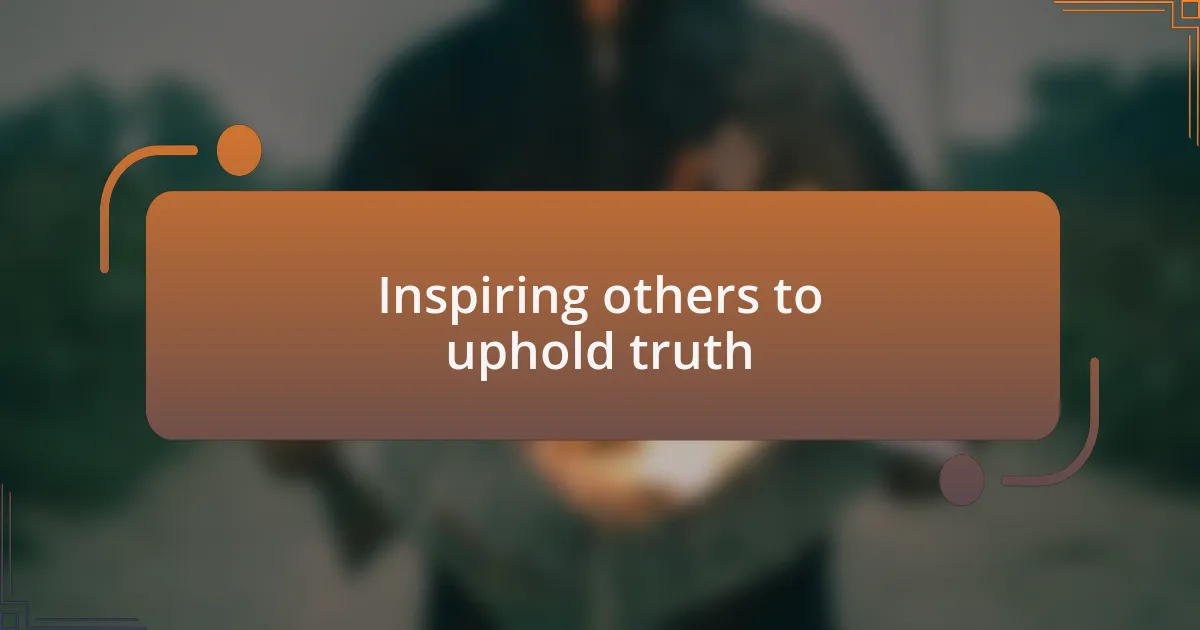
Inspiring others to uphold truth
One way to inspire others to uphold truth is by modeling it in our daily conversations. I recall a conversation I had with a friend who was skeptical about pro-life statistics. Instead of brushing off her questions, I took the time to explore them together. Sharing credible sources and engaging in a meaningful dialogue not only strengthened our friendship, but it also reinforced the idea that truth thrives in open discussions. Have you ever noticed how discussing different viewpoints can shed light on a shared understanding?
Moreover, storytelling can be a powerful tool in advocating for truth. I often share heartfelt narratives from individuals whose lives have been altered by the choices surrounding pregnancy. I remember hearing from a mother whose unexpected pregnancy led her to discover a passion for supporting others in her community. Her story exemplified the grace found in tough decisions. Isn’t it incredible how these authentic journeys can illuminate the essence of our truths?
Encouraging others to reflect on their values is another vital step in nurturing integrity. I once led a workshop where participants identified their core beliefs related to life and choice. Facilitating this exercise opened up a space for vulnerability that transformed the atmosphere; everyone felt prompted to express their thoughts honestly. What I found was that truth inspires action, and when we ask ourselves what we truly believe, we can become beacons of that truth for others.